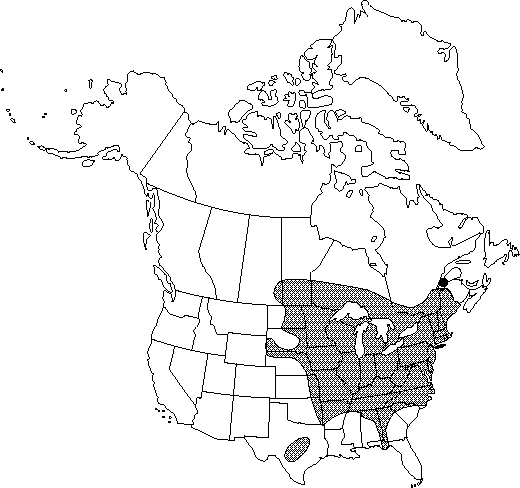Difference between revisions of "Aquilegia canadensis"
Sp. Pl. 1: 533-534. 1753.
FNA>Volume Importer |
FNA>Volume Importer |
||
| Line 42: | Line 42: | ||
}}<!-- | }}<!-- | ||
| − | --><span class="statement" id="st- | + | --><span class="statement" id="st-undefined" data-properties=""><b>Stems </b>15-90 cm. <b>Basal</b> leaves 2×-ternately compound, 7-30 cm, much shorter than stems; leaflets green adaxially, 17-52 mm, not viscid; primary petiolules 17-93 mm (leaflets not crowded), glabrous or pilose, sometimes somewhat viscid. <b>Flowers</b> pendent; sepals divergent from floral axis, red or apex green, lance-ovate to oblong-ovate, 8-18 × 3-8 mm, apex broadly acute to acuminate; petals: spurs red, straight, ± parallel to divergent, 13-25 mm, stout (at least proximally), abruptly narrowed near middle, blades pale yellow or yellow-green, oblong to rounded, 5-9 × 4-8 mm; stamens 15-23 mm. <b>Follicles</b> 15-31 mm; beak 10-18 mm. <b>2n</b> = 14.</span><!-- |
-->{{Treatment/Body | -->{{Treatment/Body | ||
| Line 75: | Line 75: | ||
|publication year=1753 | |publication year=1753 | ||
|special status=Endemic;Selected by author to be illustrated | |special status=Endemic;Selected by author to be illustrated | ||
| − | |source xml=https://jpend@bitbucket.org/aafc-mbb/fna- | + | |source xml=https://jpend@bitbucket.org/aafc-mbb/fna-data-curation.git/src/9216fc802291cd3df363fd52122300479582ede7/coarse_grained_fna_xml/V3/V3_638.xml |
|genus=Aquilegia | |genus=Aquilegia | ||
|species=Aquilegia canadensis | |species=Aquilegia canadensis | ||
| − | |||
| − | |||
| − | |||
| − | |||
| − | |||
| − | |||
| − | |||
| − | |||
| − | |||
| − | |||
| − | |||
| − | |||
| − | |||
| − | |||
| − | |||
| − | |||
| − | |||
| − | |||
| − | |||
| − | |||
| − | |||
| − | |||
| − | |||
| − | |||
| − | |||
| − | |||
| − | |||
| − | |||
| − | |||
| − | |||
| − | |||
| − | |||
}}<!-- | }}<!-- | ||
-->[[Category:Treatment]][[Category:Aquilegia]] | -->[[Category:Treatment]][[Category:Aquilegia]] | ||
Revision as of 13:45, 27 July 2019
Stems 15-90 cm. Basal leaves 2×-ternately compound, 7-30 cm, much shorter than stems; leaflets green adaxially, 17-52 mm, not viscid; primary petiolules 17-93 mm (leaflets not crowded), glabrous or pilose, sometimes somewhat viscid. Flowers pendent; sepals divergent from floral axis, red or apex green, lance-ovate to oblong-ovate, 8-18 × 3-8 mm, apex broadly acute to acuminate; petals: spurs red, straight, ± parallel to divergent, 13-25 mm, stout (at least proximally), abruptly narrowed near middle, blades pale yellow or yellow-green, oblong to rounded, 5-9 × 4-8 mm; stamens 15-23 mm. Follicles 15-31 mm; beak 10-18 mm. 2n = 14.
Phenology: Flowering spring–summer (Mar–Jun).
Habitat: Shaded or open woods, often around cliffs, rock outcrops, and forest edges
Elevation: 0-1600 m
Distribution

Man., Ont., Que., Sask., Ala., Ark., Conn., Del., Fla., Ga., Ill., Ind., Iowa, Kans., Ky., Maine, Md., Mass., Mich., Minn., Mo., Nebr., N.H., N.J., N.Y., N.C., N.Dak., Ohio, Okla., Pa., R.I., S.C., S.Dak., Tenn., Tex., Vt., Va., W.Va., Wis.
Discussion
P. A. Munz divided this species into five varieties, based on size of the plants, sepals, and leaflets and whether the leaves are 2-3×-ternately compound. The variation in size of these organs is not discontinuous or even bimodal, however, and I have not seen any material with 3×-ternately compound leaves. For this reason, no varieties are recognized here. The name Aquilegia canadensis var. hybrida Hooker has been misapplied to this species; the type specimen actually belongs to A. brevistyla (B. Boivin 1953).
Aquilegia canadensis has also been reported from New Brunswick, but the specimen has been destroyed and the species has never been recollected in the province.
Native Americans prepare infusions from various parts of plants of Aquilegia canadensis to treat heart trouble, kidney problems, headaches, bladder problems, and fever, and as a wash for poison ivy; pulverized seeds were used as love charms; and a compound was used to detect bewitchment (D. E. Moerman 1986).
Selected References
None.
